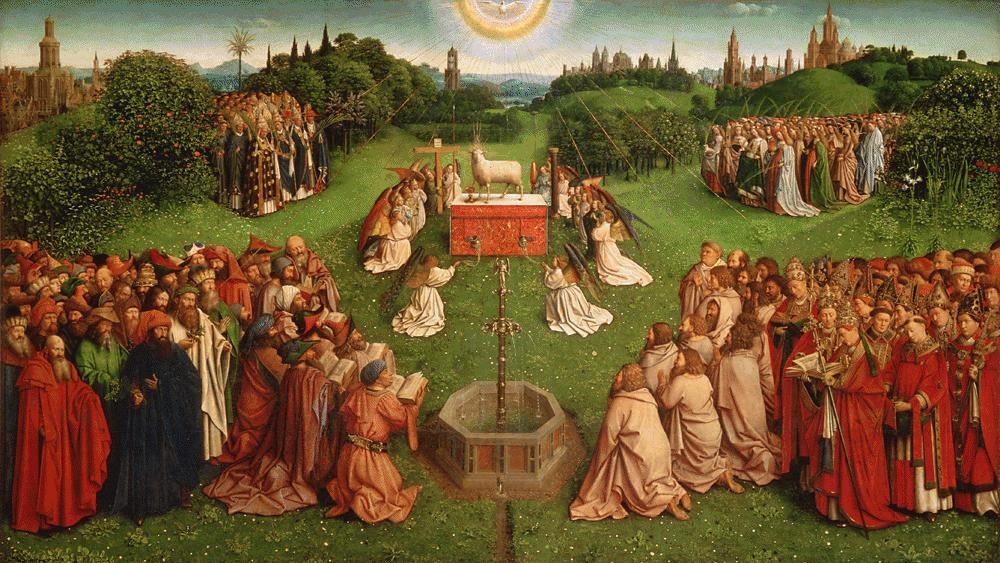In the previous section, we did not examine whether the ‘religious’ or the ‘non-religious’ position is more correct, but only the impact of such worldviews on societies. However, an examination of one of the most important dominant ideas of modernity—atheism—would be incomplete if, in a concession to modern nihilism, we were to adopt a stance of epistemological scepticism or relativism and declare that the problem of truth does not matter at all. However positive it may be for society if its members believe in a certain image of God, one might argue that if the assumption of a god-image is completely counterfactual, then truth itself—Aletheia in the Platonic and Heideggerian sense—suffers a serious blow. Although the existence of God—a particular image of God, or God as a personal being—cannot be proven by the means at our disposal (nor can it be disproven), one may argue that the very explainability of existence and subjectivity is seriously flawed if we simply discard the notion of spiritual transcendence from our thinking.
As mentioned earlier, the overwhelming majority of people have a bias towards action rather than speculation. No matter how religious a society you live in, you will not speculate about how the apple came to be on the table, what it is made of, or how it came into being, and so on—you will simply eat the apple, or not. Deep religiosity is an exception, even in generally religious societies.
Of course, the pragmatism that characterizes much of the population need not imply a lack of deep and coherent thinking. However, in everyday life, the emphasis shifts: since most people feel that the question of ‘how’ is more important than ‘why’, it is natural that they are not constantly aware of their own existence. And this is one of the most important aspects of the question of religiosity—and of the problems surrounding the acceptance or denial of God.
Man usually moves his limbs without being aware of it. But in order to move his hand—or even to will the movement of reaching out and grasping the apple on the table—he must first be. Yet he takes it for granted that he is a person, from the moment he becomes self-conscious. But this is not natural: it is not natural that the person is, because, to paraphrase Heidegger’s famous statement, ‘it would be much simpler if it were not.’ This proposition is crucial.
‘It is not natural that the person is, because, to paraphrase Heidegger’s famous statement, “it would be much simpler if it were not.”’
First I ‘am’, then I ‘do’—and all my actions are permeated by the experience of ‘I am’. If one turns inward—for example, while standing alone in nature in an inspired moment—and perceives this strange, not self-evident, not natural quality of one’s own being, one’s next question may be: where does this being come from? ‘Did I get my being from myself, or does this being belong to something else within me?’[1]
The usual or pragmatic answer—that my being follows from the being of my parents—is not a true answer. For then their being would also follow from the supposed being of their own parents, and by extending this chain ad infinitum, we end up either with the hypothetical primordial matter of the materialists (the very assumption of which, as we have seen, is highly problematic), or with a supramaterial force that creates matter.
If we were to rely exclusively on empiricism in this case, we would have to doubt even the fact of our own birth, since no one experiences or remembers their own birth. According to the rules of the system, this is not an empirical experience that we can accept as ‘true’: to believe the account of others regarding the fact of our own birth is the very opposite of empirical logic. I can only be sure that I am me, as Descartes’ empiricism already stated, since the actual world around me could be a dream or an illusion.
It is obvious from experience: although I undoubtedly am, my existence is contingent—I am ageing, I may fall ill, and I am likely to die. Even if I lose limbs or certain organs, or if my thinking and mental state are radically altered (for example, if I go mad), it is still evident that I am.
In other words, there is something within me that does not change—something that is aware of the changes and remains the same despite them. While, from birth to death, I myself (that is, the body and soul I consider to be me) am, in a sense, completely changed, I may still be able to experience a constancy that I can call ‘my being’.
This experience has accompanied the history of civilizations since the earliest recorded history of the human race, leading to a dichotomy between phenomenon and essence in consistent philosophical thinking. Ancient philosophers with a decidedly transcendental orientation—such as Plato and Plotinus—strongly emphasized this dichotomy (which, of course, does not contradict the theory of the ‘unity of being’ in Neoplatonism). Divine messengers, prophets, and founders of religions likewise speak primarily of the unchanging essence, of the difference between phenomenon and essence, often through symbolic images and stories.
As Étienne Gilson notes, ancient Jewish thought was also familiar with this distinction. Commenting on one of the most famous passages of the Old Testament—the scene at Sinai or Mount Horeb—he writes: ‘Moses, in order to know who God is, turns to God himself… Among all the divine names there is one that is eminently God's own (Qui est)—nothing other than being itself.’[2]
The meaning of ‘I am who I am’ (from the Hebrew ehje aser ehje)—‘I am who I am–I was–I will be’[3]—is, in fact, a self-revelation of actual Being, clothed in symbolic images. Early and medieval Christian philosophy and theology also posited the distinction between Being and being. God, not unrelated to the statement in the Book of Exodus, was conceived as a permanent, unchanging presence behind the things of the world, named as the ‘being of being’.
For example, as Paul Bolberitz puts it: ‘Existence: all things in the world, including man (Greek: on, Latin: ens). Being, by contrast, is the reality (Greek: logos) that provides the basis for beings. All beings can exist only because they share in being.’[4]
Gilson went further to say that, for the Middle Ages, God alone was considered the ‘complete being’, and everything else was a secondary, contingent reality that existed only insofar as it participated in being par excellence.
‘If God is Being, then He is not only total being: totum esse; as we have seen, He is also true being: verum esse. This means that everything else has only partial being, and does not even really deserve the name of being. Thus, then, all that we think at first sight constitutes the reality par excellence—the world of extension and motion that surrounds us—is relegated to the twilight of appearance, to the lower zone of almost unreality...All that Plato said on this subject (about sensory reality not being true reality) is true for the Christian, but its truth is much deeper than Plato would ever have thought...As soon as we say that God is Being, it is clear that in a certain sense God is the only one who is.’[5]
‘If God is Being, then He is not only total being: totum esse; as we have seen, He is also true being: verum esse’
St Augustine also captures the same point vividly:
‘Don't turn outward, go within, the Truth resides in the inner man. And if you discover your own changeable nature, go beyond yourself. But remember that you cannot stop there: you must go beyond the reasoning mind. Seek, then, the source of the light of intellect itself.’[6]
Or elsewhere:
‘From here I received a warning to return to myself, and therefore, with your guidance, I entered into my inner self, and I was able to do so because you became my helper. I entered in, and with a kind of eye of my soul, above this eye of my soul, above my intellect, I saw an unchanging light.’[7]
Before modern rationalism became widespread, societies perceived the unchanging essence behind phenomena not only through their most eminent ‘intellectuals’, but also collectively, despite the pragmatism of ordinary people. The ‘men of the spirit’—those few who were able to turn their attention away from the surface of phenomena and toward the essence experienced as inner being or ‘self-being’—always had a peculiar and distinct quality of relationship with pure being as spiritual essence, different from that of the majority. This is the origin of the true priesthood, and also of the true intellectual; it is likewise the origin of religion in the broadest sense.
It is a historical fact that the shaman, the priest, the ancient philosopher, and the ‘sage’ were held in genuine respect in all societies—at least in all pre-modern societies. Even though the majority of people in those times may have been just as pragmatic as people today, the central role of religion in pre-modern societies suggests that the majority also turned more intensely toward revelations about existence.
It was the founder of religion, the (socratic) philosopher, the priest in the archaic sense, who was able to communicate teachings on spiritual essence, partly through his own experience and partly through his intense immersion in non-changing existence. Later, religions were able to make the experiences of these exceptional individuals, through the rites that emerged, come alive for members of society who did not have the same capacity for immersion.[8]
Everywhere, religion follows from the fact that—even if not necessarily in an intellectualised form—people generally feel and know that the phenomena of the world (including their own bodies) are subject to change, that is, to decay and destruction. If, however, despite the general entropy observed in everything and everywhere, the world does exist—and exists in an ordered and structured form—then its cause must lie beyond the phenomena themselves. In other words, the ultimate cause can only be metaphysical in the literal sense of the word. In this light, materialist, positivist, and rationalist explanations that reduce the origin of religion to mere ‘fear’ or ‘not knowing things’ are profoundly unsatisfactory.[9]
‘Everywhere, religion follows from the fact that...people generally feel and know that the phenomena of the world...are subject to change, that is, to decay and destruction’
That non-variable which—if we consider it immanently—we may call ‘the being of beings’, or, if we consider it transcendentally, ‘being itself’, was also recognized by those who, though unable to escape the attraction of material things and forms, or to look beyond finite phenomena toward the ‘infinite’ essence behind them, nevertheless did not accept the finite as the ultimate cause of phenomena. Pre-modern society perceived—precisely because its members were not educated to think ‘scientifically’ in the modern sense—that the world could not be its own cause.
The existence of God cannot, of course, be proven in the mathematical sense of the word—but such proof would not be appropriate in any case: nothing can be proven except mathematical truths or axioms themselves. When atheists accuse theology and myth of referring to beings not found in empirical reality—ie that they do not ‘exist’ in that sense—they are undoubtedly correct on their own terms. But this argument is extremely primitive.
It ignores the fact that God—or even the non-Christian, Greco-Roman, or Hindu mythological gods—are not, strictly speaking, existents, but aspects of Being itself. Being is not present in an abstract way, somehow ‘floating’ above physically tangible existents; rather, it is present as ‘immanent transcendence’ within existents themselves: at once fully filling them, and partially withdrawing at the inevitable destruction of existents. Of course, if a theology does not emphasize sufficiently that when we speak of God, or say that ‘God exists’, we are not referring to an objective being such as a chair or a man—that is, a being that can be found in any sense within the circle of being—then we can hardly expect any other kind of counter-argument.
God cannot be found ‘somewhere’ not because He is ‘invisible’ in the physical sense, but because space and time do not contain their own source by definition. In Christianity, God entered the realm of existence only once, in the form of Jesus Christ, while other traditions, such as Hinduism, speak of several Avataras, or ‘divine descents’. In essence, however, these concepts do not contradict each other. In scholastic formulation, the essence of God is not ‘being as existence’ but ‘Being as Being’, or ‘Being—within—existence’. The concept of God, of course, takes many forms, but all forms relate to the diversity of human experiences of Being. God can be conceived as personal—that is, as a Creator God conceived as a person, as in Judaism, Islam, and Christianity—but also as an impersonal, even non-theistic transcendence, as in Buddhism and Taoism. These ideas only seem to contradict each other; what follows instead is not the relativity of the concept of God, but the diversity of human thought and mentality. No man-made concept can by itself describe or encompass a reality beyond concepts, so any concept of God can only be a groping for an approximate—even negative—description of an absolute beyond ‘being’. [10]
In fact, religious views may have often been expressed in a rather naive form: that is, the assumption of a difference between an unmanifested ‘first cause’ and a manifested form presupposes an abstract capacity for thought that the majority of the population does not possess. Religion has always been transmitted to the masses in the form of mythologies, stories, and ‘able speech’.
It has certainly not benefited religious approaches that, in various faiths—including historical Christianity—the assertion of God has taken on a rather anthropomorphic appearance as history ‘progressed’. Since man, in general, is ‘too human’, a certain degree of anthropomorphization—given that the ‘contemplation of transcendence’ was necessarily restricted to the circle of philosophers and founders of religions—may even be considered necessary. However, complete anthropomorphization of God has always been forbidden: examples of this can be found in Judaism, in the taboo on YHWH, and in Islam, in the prohibition of human depictions.
The problem of anthropomorphization—the endowment of the first cause, or ‘immovable mover’, with human qualities—on the one hand helps the finite mind to ‘approach’ the infinite, and so it is always, without exception, present in all religions. Yet it can also lead to a very low theological standard, especially when judged by the criteria of modern rationalism. When the principle of ‘free biblical interpretation’ was introduced in Protestantism, it was, with very few exceptions, precisely on the basis of a kind of modern rationalism that the mystery of Revelation was approached. Thus, since it could be interpreted by anyone, the most superficial explanations quickly emerged. Compared with the ancient sermons of St Gregory of Nazianzus or the medieval sermons of Meister Eckhart, these interpretations were of low standard and only served to definitively undermine the authority of religion in the eyes of rationalists and materialists, proving that religious people actually lack intellect—or put it aside when they ‘believe’.
In the sense of medieval theological positions and scholastic existential analogy, it must also be said that all that is human in any sense can in fact only be analogically related to God.[11] On the other hand, it must also be said—based on the relevant biblical commentary literature—that those biblical descriptions which refer to ‘changes’ in God,[12] such as God ‘becoming angry’ or ‘forgiving’ the sinner, must, according to St Augustine’s seminal work on the Trinity, be interpreted non-literalistically.[13]
A constant temptation, linked to anthropomorphizing and materializing tendencies, appeared already in Catholicism—especially in the context of the decline of Christian civilization in the Middle Ages—in the form of the idea of a ‘too human’ God, which later became a mocking target of the ‘Enlightenment’.
‘All that is human in any sense can in fact only be analogically related to God’
No doubt, it is not easy to bridge the abstract quality of God as first principle or pure being, and the notion of God as person in the parables and teachings of the people. But theologians have little choice if they are to preserve the concept of God amid the current tide of atheism. For a mind raised on modern scientific rationalism, incapable of a symbolic reading of the signs of existence and totally ignorant of the metaphysics expressed by biblical symbols, God is a symbol of the existence of the universe; everything that appears anthropomorphic to the concept of God is still simply associated with the pre-scientific myth (myth is the Greek word myein, derived from ‘to tell’), with the ‘theological age’ of Comtean positivism, or ‘childhood’ in the Kantian sense.
Consequently, the idea of a Creator conceived and represented in vulgar theological approaches as a quasi-human person is not only unacceptable today but also explicitly harmful to the contemporary expressions and life-opportunities of religion, fostering further denial and turning away in philosophically or scientifically trained minds. If they must choose between a God conceived in this sense and, for example, a materialistic idea of ‘primordial matter’—even if the idea of a physical ‘primordial matter’ is as unlikely as evolution from it guided only by ‘mutation’ or ‘natural selection’—the majority of people who consider themselves ‘educated’ and ‘enlightened’ would today undoubtedly choose the latter.
[1] In fact, instead of ‘I have being’, it would be more logical and consistent with experience to say ‘I belong to being’ — but man, as long as he is man, can only experience ‘beingness’ as belonging to his own person, due to his limited perspective.
[2] Étienne Gilson, The spirit of medieval philosophy, Paulus Hungarus/Cairo, Martonvásár, 2000, p. 47.
[3] Exodus, 3: 14.
[4] Pál Bolberitz, Being and Cosmos, Ecclesia/Budapest, 1985, p. 19.
[5] Gilson, p. 65.
[6] St Augustine, De vera religione ch. 39, p. 72.
[7] György Heidl, The Mysticism of Saint Augustine I, Kairos, Budapest, 2004, p . 58.
[8] In Sunni Islam, it is precisely to avoid this situation to a certain extent that the generally obligatory practice of five daily prayers was established: a person engaged in social activities is thus ‘unable’ to forget God.
[9] Philosophy, influenced by ethnography and materialism, assumed from the late 18th century that religion—the ‘premodern consciousness’—was underdeveloped because it lacked ‘rational’ science, was unable to ‘explain’ the phenomena of the world, and therefore ‘imagined’ that these were created by mysterious and inexperienced spiritual beings. For example, István Hahn writes: ‘Behind this concept of God, which seems highly practical, lies the ancient belief—not limited to Roman religion—that the success of all our practical activities depends not only on the “rational” factors we know, can calculate, and control, but also on other forces beyond ourselves, which we cannot directly control, and which can therefore be called “above us”. Without their support and cooperation, all human efforts are ultimately futile. It was the fear of these superhuman forces, on the one hand, and the desire to obtain their help, on the other, that gave rise to the religious ideas and rites of the earliest inhabitants of Italy.’
[10] There is, for example, a lot of misunderstanding in the Western world about the ‘non-theistic transcendence’ in Buddhism. Some prominent atheists (Harari, Dawkins) have concluded from this that Buddhism is genuine atheism, and thus a kind of ally of modern atheism and materialism. However, this fiction is not real. As Frithjof Schuon writes: ‘Some will no doubt point out that Buddhism proves that the notion of God has nothing fundamental about it and that one can very well dispense with it in both metaphysics and spirituality; they would be right if Buddhists did not possess the idea of the Absolute or of transcendence, or of immanent Justice with its complement, Mercy; this is all that is needed to show that Buddhism, though it does not possess the word for God—or not our word—nonetheless possesses the reality itself.’ Frithjof Schuon, Logic and Transcendence, World Wisdom, 2009, p. 51.
[11] ‘The existence of creatures is an analogy of the existence of God...Just as God's existence is that by which He is, so human existence is that by which He is. But this does not imply that God's relation to his being is the same as man's relation to his being...but only that each is related to himself as the others are related to themselves (analogy of being)...the creature's likeness to God consists only in the fact that both exist[...] not in their being alike.’ Gilson, pp. 104-105 (and footnote 16).
[12] According to the theology of St Thomas, it is impossible for God to change: 'Everything that changes is in some way in faculty being: for change is the transition of faculty being into reality. But on the basis of the argument from God in motion, we must regard God as pure reality.’ (Alfréd Turay, Philosophers in Search of God, 1990, p. 161. ) But the various 'actions’ which are commonly connected with the being of the person would presuppose changes, growth or diminution in God.
[13] See: ‘Philosophical (and biblical) hermeneutics shows that the above statements are not to be taken literally. St Augustine interprets divine “wrath” and divine “forgiveness” in this way: “The change is in the eye, not in the light” (De Trinitate 5, 16). God does not intervene in the events of history in a human way, nor after the fact. The world unfolds in the power of a divine programme that takes account of chance and free human action, and thus the prayer of man at a given point in history is always “answered” by the cosmos and the events of history. But theology also stresses in this context that these “answers” are intended to promote man’s salvation and therefore do not, in most cases, meet the narrow-minded creature’s expectations.’ (Ibid.)
Related articles:





